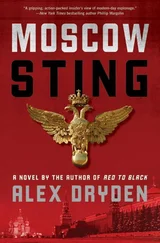And behind the slumped human flotsam on the quayside, the broad, tumbling green and brown Yenisei river worked its icy way through the dockyards and the shabby piers toothed with cranes and derricks. It, too, was heading north, beyond the Arctic Circle to the Kara Sea, though with a force and energy that made the humans on the quay seem half-dead.
The line shifted and Anna shuffled forward a step.
She noted that the city’s tilting quays through which the river rushed had only recently been released from snow. The rusted vessels that lay alongside them had been laid up for the winter when the river was partially iced, but they looked as if they’d been discarded decades ago and left to rot beneath the aluminium smog of Krasnoyarsk.
In most cases, however, the ships’ engines were kept in surprisingly good working order – she could hear them now – thanks to the necessity of eking out everything that could be summoned from machinery and man combined. Many of the ships were over a hundred years old. The river water on which they operated didn’t have the corrosive effect that salt did on seagoing vessels.
And behind everything – the hiring office, the line of people and the busy quays – she was aware of the polluted city that squatted on the vast Siberian land like a sick and rasping ogre.
Anna forced her eyes down again, while occasionally flicking a glance from under her peaked cap to right or left. It was an instinctive reaction, born of a life of watchfulness, the life of a spy. The real Anna Resnikov had always been one of two things; either the hunter or the hunted. Here, on enemy territory, she was undoubtedly the latter. And she could afford no more lapses of the kind that had afflicted her at the border.
A ship tooted its horn in the background, as if impatient to be off downstream. Several ships were preparing for the first voyage of the year down the Yenisei. The various rust buckets leaned exhaustedly up against the quays, their half-loaded holds tilting them this way and that. Only the newer passenger ferry that took the few tourists part of the way to the Arctic Circle and rested on a quay of its own seemed fit for the journey.
The sound of diesel engines being test-run for the 1500-mile journey downriver towards and beyond the Arctic Circle numbed the hearing. Perhaps this, too, explained the bent heads of the unemployed. Conversation was almost impossible above the engines and the shouted instructions of the foreman or the whooping cries of stevedores.
The foreman was a rumbustious six-foot-four giant by the name of Ivan, born and bred in the Siberian taiga and descended from nineteenth-century Russian settlers – as he’d lost no time in proudly explaining to the people in the line. He was looking up and down the line now with his sneer of contempt. But when his eyes rested on Anna, as they had done several times already, his expression changed to one of intense, and greedy, study. It was just what she did not wish for – to be noticed at all, let alone studied with the foreman’s fixed stare.
Nearing the front of the line, Anna had now almost reached the door of the hiring office.
She averted her eyes from his gaze. She was close enough to the hiring office to be able to see inside the small building, which was little more than a concrete box. What she saw was a dark room, furnished – if that was the word – with only a worn wooden table and two wooden chairs, one of which was to receive each applicant for the summer jobs. The lumber mills down river at Igarka were changing from their pared-down winter shift and increasing their workforce for the few months of the summer. With the ice broken, the ships were now able to take the work crews downriver at last. Up in the river’s huge bays around Igarka, a thousand miles to the north, the great rafts of loose logs would soon also find the way free to the northern Arctic sea port of Dikson.
To take her attention away from the foreman Ivan, Anna looked at the decrepit building that was the hiring office. It was made of poor materials – that much was clear – which the ice winters had made worse with chips and gouges in the concrete. It was little more than a block of pale, disintegrating cement.
From the look of it, it had been erected more than half a century before by Stalin’s slaves before the dictator’s death. The starved and beaten political exiles whose job it had been back then to build it either didn’t know how to make concrete or they lacked the proper equipment to do so.
Directing her eyes around the foot of the building, she also now observed four courses of uneven brickwork. They were so poorly made that her eyes fixed on them for a long time and it was then that the foreman seized the opportunity. He came up too close to her and spoke, breathing hotly in her ear as he did so. He’d been looking for just such a chance as this.
‘That’s what you get when low-life political exile scum do the work for you!’ he sneered and nodded at the brickwork.
Anna turned away from him and fixed her mind ahead in time.
Fifteen hundred miles to the north of where she stood, up in the Kara Sea where the river disgorged itself into the salt waters of the Arctic, the ice was still solid – nearly ten feet thick in places. Now in spring the disparity between the melted waters of the south and the frozen ice in the north was causing its annual, cataclysmic freak of nature. Backed up against the northern ice, the melted water down here built up into a dangerous surge that carried thousands of trees torn from the river’s banks and tons of boulders in a headlong rush that would now be finally smashing the ice floes at the river’s mouth. The furious torrent ground the floes and broke them with ear-splitting cracks that could be heard ten miles away. Finally it reduced the ice by hurling it against the bare cliffs to the north and against itself.
This event signified the end of winter at the other end, where the river met the Kara Sea. The thousands of blocks of broken ice were then dispersed by the rage of fresh water out into the Arctic and, for a time after that, the Kara Sea was filled with a small forest of broken trees bleaching slowly in the salt and the thin northern sun.
The end of May or the first half of June – depending on the severity of the winter – was the time when vessels could at last begin to head north after the seven-month grip of the Ice King. Up in Igarka and, beyond, in Dudinka, they would have begun the annual task of reconstructing the wooden piers and wharfs and port facilities which had to be dismantled every year to avoid being smashed and washed away by the surge of melted waters.
Anna glanced around casually again without perceptibly lifting her head, and again she saw the foreman watching her. She didn’t like it and he was still keeping his gaze steady. Did he suspect something? No, that was impossible. More likely, his interest in her, despite her dishevelled, dirty appearance, was that he wanted to imagine her in one of Krasnoyarsk’s pole-dancing bars and brothels. She was used to men like the foreman. So be it. She had the papers.
Then she shifted her eyes calmly past his level stare to look back at the port and the river and, behind everything, the dreadful city.
She wore old plastic yellow boots, faded brown overalls a size too big for her, and a quilted blue jacket over the top, also marked with dirt and grime, and faded like the overalls. All had been bought in one of the cheap shops on the edge of the city. Her hair, cut short and dyed black, was concealed under a military green felt cap with felt ear flaps. Her face was almost too carefully touched with worker’s grime, grease and engine oil. But the particles from the yellow-grey smog of the city that clung to her otherwise clear skin were real.
Читать дальше












